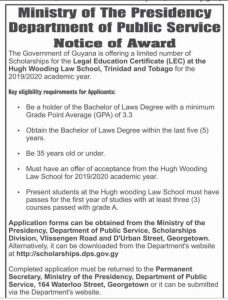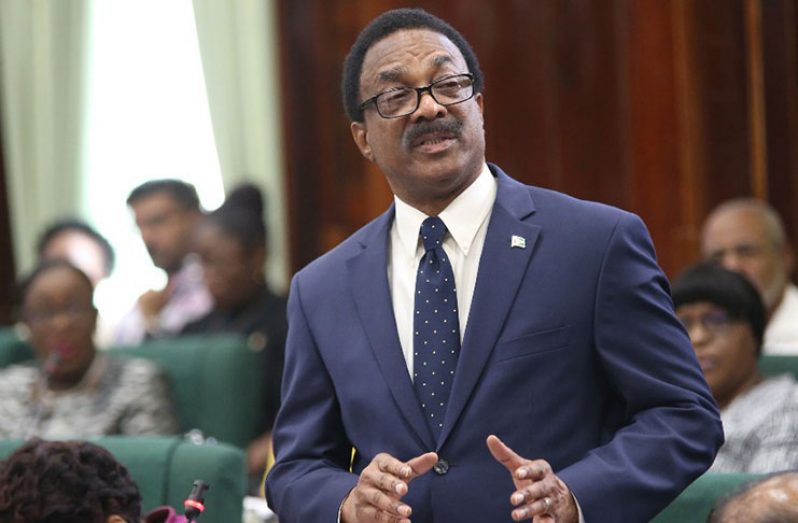AT a time when many law students find it difficult to finance their studies, the Government of Guyana has stepped in, offering scholarships to a number of students to attend the Hugh Wooding Law School in Trinidad and Tobago.
The Government, through the Ministry of the Presidency, Department of Public Service, made the announcement on Sunday via a notice published in local newspapers. “The Government of Guyana is offering a limited number of Scholarships for Legal Education Certificate (LEC) at the Hugh Wooding Law School, Trinidad and Tobago for the 2019/2020 academic year,” the ministry announced.
A Bachelor of Law Degree is a prerequisite, the ministry said, while adding that applicants must have a minimum Grade Point Average (GPA) of 3.3. While a Bachelor of Law Degree is a requirement, it must have been obtained within the last five years by person 35 years old or under. Applicants are also required to have an offer of acceptance from the Hugh Wooding Law School for the 2019/2020 academic year.
“Present students at the Hugh Wooding Law School must have passes for the first year of studies with at least three courses passed with grade A,” the ministry further detailed.
Application forms can be obtained from the Ministry of the Presidency, Department of Public Service, Scholarships Division.
This is the third major intervention the A Partnership for National Unity + Alliance for Change (APNU+AFC) Government has made for law students since taking office in May, 2015.
The APNU+AFC had entered office at a time when law students desirous of attending the Hugh Wooding Law School were faced with many uncertainties. Their acceptance into the Trinidad-based law school to read for their Legal Education Certificate was not a certainty.
Under the People’s Progressive Party/Civic (PPP/C) Administration, an agreement between the University of Guyana (UG), University of the West Indies (UWI) and the Council of Legal Education (CLE) in 2009 allowed for 25 University of Guyana Law Graduates to gain automatic entry into the TT-based law school but when it expired in November, 2012, hundreds of law students were left out in the cold. Between 2012 and 2015, UG graduates with LLB were admitted to the Hugh Wooding Law School on an ad hoc basis.
NEW AGREEMENT
It was in September 2016, under the stewardship of Attorney-General and Minister of Legal Affairs, Basil Williams, that a fresh agreement was reached with the University of Guyana, the University of the West Indies (UWI) and the Council of Legal Education (CLE), paving the way for the top 25 Guyanese graduates to be allotted automatic entry into the Hugh Wooding Law School on a yearly basis. The government, at the time of the agreement, also resumed payments, in form of contributions, to the maintenance of the Trinidad-based Law School.
Cognisant of the financial challenges faced by students, the Government, in 2016, granted approval for the payment of 25 per cent of the economic costs for Guyanese students at the Hugh Wooding Law School in an attempt to reduce their financial burdens. Guyanese law students are required to pay approximately $98,000TT or GUY$3M per year in tuition fees to attend the Hugh Wooding Law School.
But while these financial mechanisms have proven to be helpful, financially, it is still difficult for many students to attend the law school when the tuition, accommodation, transportation and other cost factors are taken into consideration. 
For those reasons, the offering of scholarships for persons to read for their LEC is most welcomed. For Akeeta Kingston, 2019 may very well be her lucky year. Kingston completed her LLB at UG in 2016, and placed seventh in the top 25. However, she was unable to muster up enough money to attend the Hugh Wooding Law School. So Kingston worked for two years, then the opportunity came in the form of a scholarship, for her to go to India to read for a Master of Law (LLM) in Public Law and Legal theory. Though this was a major accomplishment, the young woman said that she still cannot practise because she is not in receipt of her LEC.
“I want to be a Parliamentary Counsel because I want to play a role in drafting of legislations. I think they can do so much better in that area, and I want my input to be recognised. I’d need my LEC for that,” Kingston told Guyana Chronicle.
STUMBLING BLOCKS
To ease the financial burdens and to provide another avenue for legal education, the Attorney- General, since taking office, has proposed the establishment of the JOF Haynes Law School but that has been met with stumbling blocks. The Council of Legal Education has indicated that the feasibility study submitted on the school is not in compliance with the treaty that established the CLE. In 2018, it said the CLE does not provide for third parties, and the model proposed by the Guyanese Government was by way of a Public Private Partnership with Law School of the Americas (LCA) and the University College of the Caribbean (UCC).
However, the February 2018 Final Report on the Survey of Legal Education in CARICOM Member States, which was conducted by the Improved Access to Justice in the Caribbean (IMPACT Justice) and funded by the Canadian Government, underscored the need for Guyana to have its own law school.
In that report, it was recommended that law schools should be established as part of Utech in Jamaica, UG in Guyana and possibly in Antigua and Barbuda.
According to the report, the establishment of additional regional law schools in the three jurisdictions under the CLE would provide an easy mechanism for addressing the unsatisfied demand for access to practise law by the many persons who are holders of non-University of the West Indies (UWI) LLB degrees.
The Attorney-General, in support of his vision of having a law school here, had reminded the CLE that there are legal provisions that allow for the establishment of additional law schools to complement the Hugh Wooding Law School and the Norman Manley Law School.
“By virtue of Article 1 Paragraph 3 (B) of the Agreement establishing the CLE, it is inter alia empowered to establish, equip and maintain law schools, one in Jamaica, one in Trinidad and Tobago and in such other territories as the Council may from time to time determine, for the purpose of providing postgraduate professional legal training,” Minister Williams had pointed out.
He said with Guyana on the verge of becoming a major oil and gas producing nation, it is even more important now than ever that a law school be established here.
“We obviously have to be able to train lawyers in this area. We have to get ownership of the industry, of the sector. We have gas also, and we also have a green state strategy dealing with the environment, and these are all new areas [in which] we have to train lawyers,” the minister had explained. On the basis that approval was granted for the school to be established, the Attorney-General in 2017 announced the launch of the project for establishment of the JOF Haynes Law School, a move which was welcomed by both practising and aspiring lawyers but the project has been stalled since September 2018.



.png)









